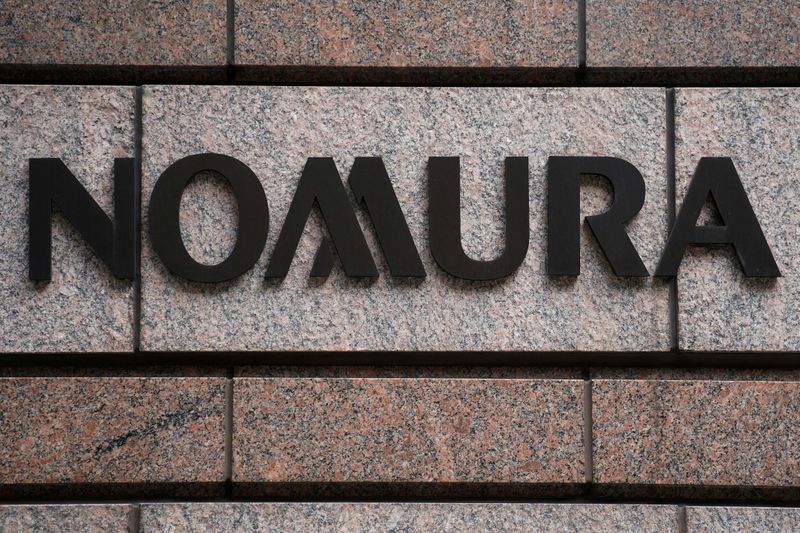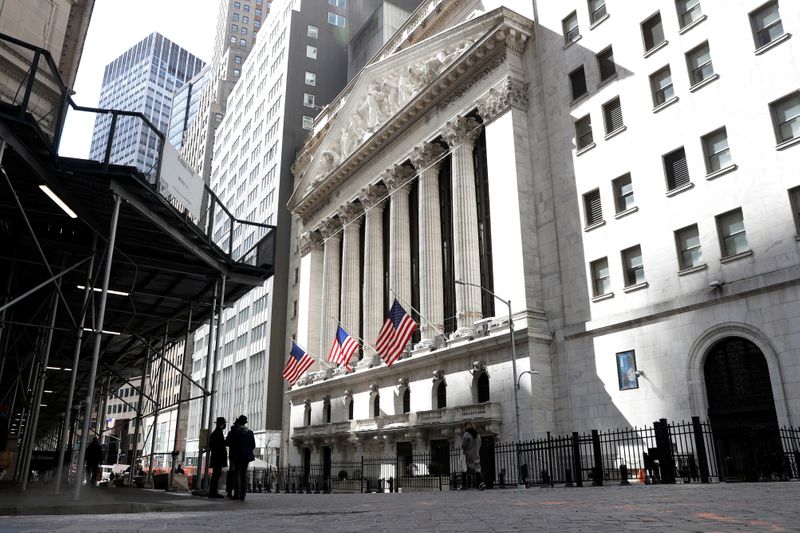By Makiko Yamazaki, John Revill and Matt Scuffham
TOKYO/ZURICH/NEW YORK (Reuters) - Global banks may lose more than $6 billion from the downfall of Archegos Capital, sources familiar with trades involving the U.S. investment firm said on Monday, as regulators and investors feared the episode would reverberate more widely.
Japan's Nomura and Credit Suisse (SIX:CSGN) of Switzerland warned of major losses from lending to Archegos for equity derivatives trades, triggering a worldwide sell-off in banking stocks.
Morgan Stanley (NYSE:MS) shares fell 2.6% and Goldman Sachs Group (NYSE:GS) dropped 1.7%. Nomura shares closed down 16.3%, a record one-day drop, while Credit Suisse shares tumbled 14%, their biggest fall in a year. Deutsche Bank (DE:DBKGn) dropped 5% and UBS was off 3.8%.
Losses at Archegos Capital Management, run by former Tiger Asia manager Bill Hwang, sparked a fire sale of stocks including ViacomCBS (NASDAQ:VIAC) and Discovery (NASDAQ:DISCA) on Friday, a source familiar with the matter said.
"This is a challenging time for the family office of Archegos Capital Management, our partners and employees," company spokesperson Karen Kessler said in a statement. "All plans are being discussed as Mr. Hwang and the team determine the best path forward."
Archegos was unable to meet banks' calls for more collateral to secure equity swap trades they had partly financed. After those positions fell sharply in value, lenders sold big blocks of securities to recoup what they were owed, the sources said.
"This is the kind of thing that happens in a speculative environment. You start finding that things go wrong," said Richard Bernstein, chief executive of Richard Bernstein Advisors. "When you have people making certain bets based on what has outperformed in the past and the tide turns they get burned. The question is how much leverage they used."
Nomura, Japan's largest investment bank, warned of a possible $2 billion loss, while Credit Suisse said a default on margin calls by a U.S.-based fund could be "highly significant and material" to its first-quarter results.
Two sources said Credit Suisse's losses were likely to be at least $1 billion. One of them said the losses could reach $4 billion, a figure also reported by the Financial Times. Credit Suisse declined to comment.
But several other banks appeared to be relatively unscathed. The financial impact on Goldman Sachs was immaterial, a separate source said. Likewise, Morgan Stanley, which sold $4 billion in stocks related to Archegos on Friday, did not incur major losses, CNBC reported.
Deutsche Bank said in a statement it had significantly de-risked its Archegos exposure without incurring any losses and was managing down its "immaterial remaining client positions," on which it did not expect to incur a loss.
The broader market impact was muted with the U.S. S&P 500 benchmark closing slightly lower, while financials ended down more than 2%.
"You continue to see strength in the overall market. There is not fear of selling stocks all together, there's just fear in pockets of the market," said Dennis Dick, head of market structure at Bright Trading LLC in Las Vegas.
REGULATORS WATCHING CLOSELY
Investors questioned if the full impact of Archegos' problem had been realized.
Market observers noted that only in February, hedge funds took major losses on short positions during the run-up in GameStop Corp (NYSE:GME) stock. That forced hedge fund Melvin Capital Management to borrow money from another fund to stay afloat. Hedge fund de-leveraging also contributed toward turmoil in the U.S. Treasuries market in March 2020.
In the case of Archegos, the opaque and complex nature of its derivative trades, lightly regulated structure as a family office and high leverage - fueled by historically low interest rates - prompted concern about potential systemic risk.
Regulators in the United States, UK, Switzerland and Japan said they were closely monitoring developments.
Archegos bought derivatives known as total return swaps, which allow investors to bet on stock price moves without owning the underlying securities, according to one source familiar with the trades. The fund posts collateral against the securities rather than buying them outright with cash.
Archegos' positions were highly leveraged. The firm had assets of around $10 billion but held positions worth more than $50 billion, according to the source who declined to be identified.
Thomas Hayes, chairman of Great Hill Capital LLC in New York, said Hwang was known to run "a very concentrated, highly leveraged book."
The underlying shares were held by Archegos' prime brokers, which lent it money and structured and processed its trades. They included Goldman Sachs, Morgan Stanley, Deutsche Bank, Credit Suisse and Nomura.
Unwinding the positions led banks to sell large blocks of stock. Shares of ViacomCBS and Discovery each tumbled around 27% on Friday, while U.S.-listed shares of China-based Baidu and Tencent Music plunged as much as 33.5% and 48.5% last week.
Other stocks caught up in Archegos-related liquidations included Baidu Inc (NASDAQ:BIDU), Tencent Music Entertainment Group (NYSE:TME), Vipshop (NYSE:VIPS) Holdings Ltd, Farfetch (NYSE:FTCH) Ltd, iQIYI Inc and GSX Techedu (NYSE:GSX) Inc.
Hwang, who ran Tiger Asia from 2001 to 2012, renamed the hedge fund Archegos Capital and converted it to a family office, according to a page capture of the fund's website. Family offices act as private wealth managers and have lower disclosure requirements than other investment companies.
Hedge fund managers said they wondered why Hwang, whom several described as a "smart guy," had made such big bets on ViacomCBS and Discovery, given the large wagers against the companies. The pair are not seen as high-growth plays, in contrast to other media stocks that have outperformed during the COVID-19 pandemic, the sources said.

Hwang and his firm in 2012 paid $44 million to settle Securities and Exchange Commission insider trading charges.
